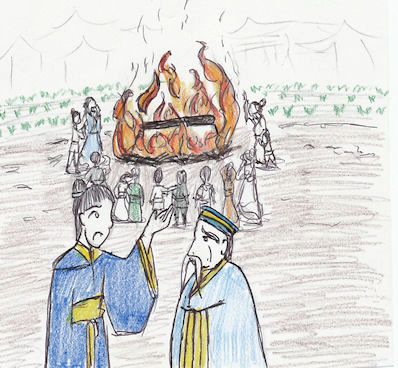previous contents next
Chapter 9: The World Beyond the Wall: Trip III
Some say that it happened just after Xīdá-duō asked Chēnì what death was all about. Others say that it happened when they made a third trip, going out through the south gate of the great estate and well beyond its walls.
However it happened, it was probably inevitable. As they crossed a road, a funeral procession passed, with a corpse apparently sleeping on a bier. Chēnì tried to draw him away, but Xīdá-duō was fascinated.
The body was surrounded by wailing people. Indeed, the prince had never seen such grief before. Even as they looked on, the mourners put the body in a box and placed it on a pyre, which they set afire.

Even as they looked on, the mourners put the body in a box and placed it on a pyre, which they set afire.
Drawing by Lan-Anh Pham, Sixth College (UCSD), Class of 2011, by permission
It is hard to say who was more horrified, Xīdá-duō because they were about to burn a person, which he knew would be very painful, or Chēnì, who knew that there was no way Xīdá-duō was not going to learn what death was.
As the fire rose up, the body still lay peacefully on the pyre. Xīdá-duō was amazed that it did not awake, and, of course, he asked Chēnì how this could be.
The driver gave in and explained that the man was dead, and that none of his body could be used any more because he had no consciousness. And so they were burning it because a body without consciousness was useless.
Once again Prince Xīdá-duō asked if losing one's consciousness in this way was the fate of all people. And once again Chēnì conceded to him that it was.
"Even of princes, Chēnì?."
"Even of princes, my lord."
They returned to the palace, and Xīdá-duō spent some time sitting alone in his room, thinking. There had to be a way to avoid old age. And sickness. And death.








